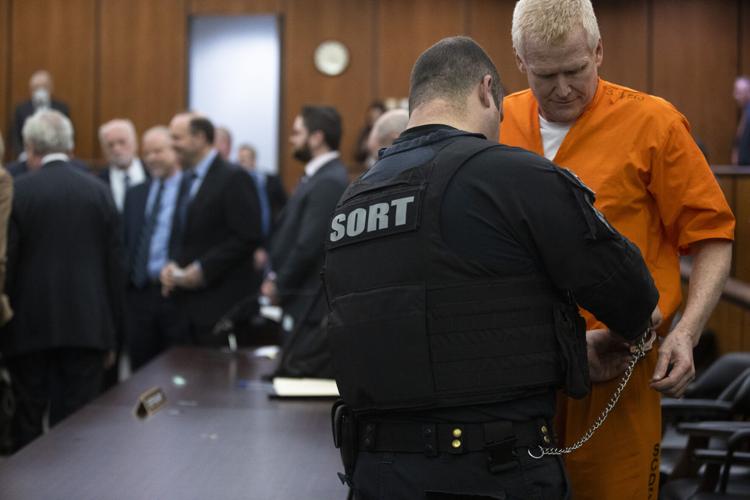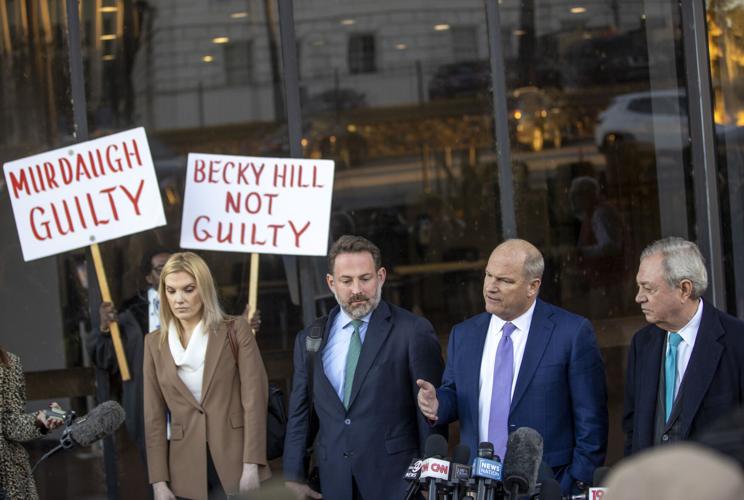COLUMBIA — Alex Murdaugh will not get a new murder trial, former S.C. Chief Justice Jean Toal ruled Jan. 29, even after one of the jurors who convicted him said the clerk of court made comments during his case that influenced her decision.
Toal admonished Colleton County Clerk of Court Becky Hill for following the “siren call of celebrity” at the expense of her duties, but Toal concluded that “fleeting and foolish comments” did not warrant a new trial.
Three of the jurors who found Murdaugh guilty in the June 2021 murders of his wife, Maggie, and son Paul testified that Hill made comments about the once-prominent Hampton attorney’s plans to testify in his own defense. So did an alternate juror who did not deliberate. And the clerk of court in another county said Hill made comments to her about how a conviction would help her sell copies of a book she hoped to write.
Breaking months of silence from the witness stand, Hill denied saying anything of the sort. In her ruling, Toal said she didn’t believe the clerk, whom she called “publicity-influenced.”
But in the end, Toal found that the jury had done its job, ignoring whatever was said and delivering a verdict based on the facts of the case, even though one juror indicated that the clerk’s comments weighed on her.

Colleton County Clerk of Court Rebecca "Becky" Hill swears the oath on the stand during the Alex Murdaugh jury-tampering hearing at the Richland County Judicial Center on Jan. 29, 2024, in Columbia.
That juror — identified only by the letter Z — said that before Murdaugh took the witness stand, Hill told jurors “to watch his actions” and “watch him closely.”
“To me, it felt like she made it seem like he was already guilty,” Juror Z said. Asked by Toal if the comments affected her verdict, the juror answered, “Yes, ma’am.”
The juror also confirmed that she still stood by a sworn statement she signed in August 2023. In that affidavit, she recalled that Hill urged jurors “not to be fooled” by the case Murdaugh’s defense planned to present.
But that affidavit also appeared to muddy the juror’s testimony because it stated that the juror walked into the jury room without having made up her mind. She voted to convict hours later, the affidavit said, because the rest of the jury ultimately swayed her.
None of the other jurors said their verdict was influenced by Hill’s comments, and most said they hadn’t heard her make comments about the case at all.
But in addition to Juror Z, two did report hearing something: Juror P remembered Hill encouraging the panel to “watch his body language” before Murdaugh took the witness stand, and Juror X recalled that the clerk said it was rare for criminal defendants to testify. According to Juror X, Hill either said it would be “an epic day” or an “important day.”
Hill denied making these comments, too.
Toal concluded that Hill did make inappropriate comments to at least one juror. But the outcome hinged on the high bar the judge had set for Murdaugh’s defense team to clear.

Former S.C. Chief Justice Jean Toal talks to the court during the Alex Murdaugh jury-tampering hearing at the Richland County Judicial Center on Jan. 29, 2024, in Columbia.
Prior to the Jan. 29 ruling, the justice said she wanted the defense to prove that the process had been prejudiced — essentially to show that the trial’s outcome was swayed by Hill's comments. In setting that standard, she cited a recent decision of the S.C. Supreme Court that narrowed the path for criminal defendants who believe their jury was improperly influenced.
But Toal conceded that Murdaugh’s case stands alone in the history of South Carolina’s judicial system.
“The authorities that really matter” — the state’s higher courts — will ultimately determine what standard should apply, she said. Courts around the country apply a wide range of standards when they assess the impact of alleged jury-tampering on trials’ outcomes.
Based on that outcome, Murdaugh’s defense attorneys claimed a partial victory. The judge sided with them on the facts, they asserted in a press conference after the ruling, and the law itself is unclear. They said they would take the case to the S.C. Court of Appeals, S.C. Supreme Court and ultimately the federal courts, if necessary.
Meanwhile, the S.C. Attorney General’s Office, which prosecuted the case, said it was time to move on.
The Jan. 29 proceedings were briefly thrown into chaos after a bailiff discovered that the Murdaugh jurors, who were supposed to be sequestered in the courthouse, had access to their cellphones as they waited to testify. At least some of them, Toal was told, used the downtime to watch the proceedings unfold on TV. Each of the remaining jurors affirmed that they either didn’t watch the stream or weren’t affected by it.
Murdaugh’s attorneys have long theorized that Hill might have been motivated to steer the jury toward a guilty verdict in an effort to sell books. And she conceded that she had toyed with the possibility of writing about the trial before it began.
She ultimately published one, but sales were suspended after Hill admitted lifting several pages of the text from a draft article a journalist inadvertently sent to her.
Pressed by defense attorney Dick Harpootlian, Hill also conceded that parts of the book were embellished. They included a passage in which she described walking with jurors at the Murdaugh's sprawling estate where the killings occurred.
She wrote that during the visit, which occurred near the conclusion of the trial, she locked eyes with members of the jury and realized they, too, thought Murdaugh had blasted his younger son with a shotgun and gunned down his wife with a rifle there.
Hill called it “poetic license” and “literary ease.”
Before the plagiarism revelation, Hill estimated she and her co-author brought in $100,000.
And while Hill denied that she had a financial interest in a guilty verdict, Barnwell County’s clerk of court, Rhonda McElveen, testified that Hill had told her that a conviction would be good for sales. McElveen, who helped the Colleton County staff throughout the trial, said Hill first made that comment at least a month before the trial began, then repeated it later.
McElveen, who Hill described in her book as a friend and confidante, also recalled warning Hill to be careful about her interactions with the jury. She remembered arriving in court one morning and hearing that Hill had given a juror a ride home the night before.
Yet moments earlier, Hill had testified that she never did such a thing.
Toal's findings marked a stern rebuke to Hill, whom she concluded had expressed a "desire for a guilty verdict" and "made comments about Murdaugh's demeanor as he testified" in front of jurors.
Hill was not there to hear them. After watching the remaining witnesses testify and hearing closing arguments, she and her attorneys walked out of the courtroom.













